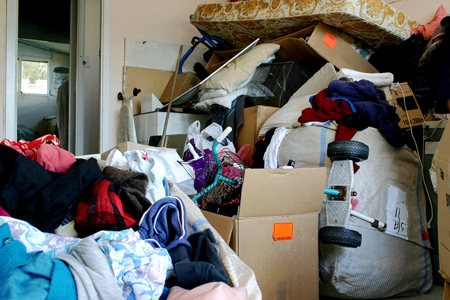 Do you have a storage problem? Do you see yourself as a collector? Or are you really a hoarder? If so, how can you tell?
Do you have a storage problem? Do you see yourself as a collector? Or are you really a hoarder? If so, how can you tell?
Many of us feel we buy too much stuff, keep too much stuff and then spend an inordinate amount of time working out how to store it. Some of us find ourselves in a constant struggle about what to get rid of and where to get rid of it (car boot? charity shop? free cycling?). And if we want to keep it, where to put it?
A quick internet search returns plenty of ‘professional organisers’ and life coaches who will offer you cognitive techniques by which you can let go of excess stuff and 'de-clutter'. Both the BBC and other channels have television series about ‘collectaholics’ and hoarders who meet counsellors persuading them to ‘de-clutter’. There are of course structural and economic contexts making it possible for members of our society to collect and hoard so many objects:
- First, people at all income levels now can afford many more material possessions than they could 30 years ago. So, in real terms, household expenditure and incomes have doubled since 1971 and the prices of food and consumer durables, e.g. electronics and white goods, have dropped relative to income.
- Second, workers carry twice as much debt – loans, credit cards, store cards – than they did a decade ago, which is linked to the massive rise in real terms of the cost of houses and services. Combining these two economic features together – cheap goods so that compulsive buying and instant gratification is possible, along with the dependency on credit – has no doubt led to a rise in ‘hoarding’ and all the businesses that have grown up as repositories for storing it or selling it on, from car boots, junk shops and charity shops to self-storage units.
However, the economic circumstances that have let this happen (and even validated and encouraged it) do not entirely explain the human or individual aspects of our relationships with the stuff we acquire. It does not explain why, in having all this stuff, many get into trouble, developing a relationship to objects that can become unhealthy for them as well as families and friends.
Many of us have wardrobes full of clothes we haven't worn for years, books we rarely read and belongings from our and our children's childhoods we cannot part with. When these hoards start to get out of control - for example, when we can no longer fit into new clothes into our wardrobe, most people will have a clear out. A hoarder, however, will never willingly throw anything away but acquire a new wardrobe or start stacking clothes on any available surface. They may even keep the wrappings from bought items.
This mental disorder – Compulsive Hoarding, as it is called – was first recognised in 2013 as having distinct symptoms in psychiatry's standard guidebook The Diagnostic and Statistical Manual of Mental Disorders. In extreme cases the hoarder accumulates and refuses to discard to the extent ordinary activities, such as eating and sleeping, are interfered with as every surface becomes inundated with objects. However, research shows that it is too easy to say that these people just collect junk because they are lazy, disorganised or even unclean, even if their home is a mess. Indeed, there are systematic motives described by hoarders that prevent them from feeling able to discard:
- To avoid the guilt associated with discarding things that might have a value or a use one day. They feel 'prepared' in case they ever need it as that day 'might' come. Environmentalism and 'recycling' probably helps to endorse the feeling that discarding things is the same as 'wasting' them. Active acquisition or buying in multiples for stockpiling is often a feature, such as never going under 30 bottles of shampoo in the house or buying 10 of the same shirt.
- The fear of losing important information printed on the page that holds potential meaning. These are people who save newspapers or magazines because they feel that if they throw out a certain article they will never get the information held within them back again. Having the physical presence of this information at hand, even if it's somewhere at the bottom of a metre high stack of old newspapers, cannot compare to getting the information from the net or the library. A variant of this is the archivist who feels a religious attachment to anything old, such as faded photos, greetings cards or receipts.
- A strong emotional attachment to inanimate objects. Each object is associated with important people, places or experiences and they become incorporated into the self, so that the prospect of getting rid of a possession feels like losing part of oneself. Everyone does this but hoarders see deeper meaning and value in far more items and a much wider variety of items.
 Taken together, there is some psychological coherence. Hoarders tend to be both perfectionist and excessively indecisive. Their inflated sense of risk means that the very act of deciding what to keep and what to throw away causes them great anxiety arising from anticipating the grief that will follow their loss. To avoid the potential loss they do nothing, preferring the security of all their possessions arranged around them like a cocoon. Although hoarders may not all be reclusive, the epithet 'buried alive' is often used, suggesting a deathlike state where the normal difficulties of human relationships have been replaced or greatly supplemented with a safer, fantasy relationship with objects.
Taken together, there is some psychological coherence. Hoarders tend to be both perfectionist and excessively indecisive. Their inflated sense of risk means that the very act of deciding what to keep and what to throw away causes them great anxiety arising from anticipating the grief that will follow their loss. To avoid the potential loss they do nothing, preferring the security of all their possessions arranged around them like a cocoon. Although hoarders may not all be reclusive, the epithet 'buried alive' is often used, suggesting a deathlike state where the normal difficulties of human relationships have been replaced or greatly supplemented with a safer, fantasy relationship with objects.
There are many popular articles on the net that link hoarding to grieving because it appears to be a defence against loss. They anecdotally support Freud's concept of anal retention which, even if you don't subscribe to the narrowness of the idea that a childhood toilet training stage can in itself be a sole determinant, describes a rigid personality founded on keeping things in and not letting go as a substitute for other, previous losses. The most obvious example of this is of someone whose loved one was deceased years before but who cannot bring themselves to take any of their possessions to the charity shop where others could benefit from them, though this may not amount to the compulsive hoarding of other possessions. Or someone whose parents lived through the Second World War rationing who cannot bear to throw out any food.
Reading through some of the research [see the Further reading list below] into the behaviour of compulsive hoarders led me to this question: If compulsive hoarders (whose hoarding is by definition out of control) are one extreme end of a continuum, how can we define a healthy relationship to personal possessions? That is, how do we judge what our beliefs ought to be about the true value of our possessions in a culture where we spend so much time consuming – shopping and buying – and when we use what we buy and how we display it to indicate our status, income and class ?
Whatever the answers are to that, I am now prompted to think hard about all the things I have insisted on keeping – actually if I’m honest, hoarded – over the years, for I now recognise I have hoarding tendencies: Schoolwork from 35 years ago that no one else is interested in, chewed up story books from when my kids were small, bike racks that won't fit my current bike, spare tiles from the garden path, mismatched bits of crockery that remind me of past holidays, and so on. When I face reality I know that none of this stuff will ever get used and I don’t look at it myself. I also know that to rid myself of it will free up a tiny bit of mental space that got periodically filled up with oppressive worry about the decisions I'd one day need to make about the piles of stuff in my loft. That day is now.
Further reading
- Compulsive Hoarding and the Meaning of Things
Randy O. Frost and Gail Steketee. published by Mariner Books, New York - Studying people: Part of our free Starting With Psychology course
Rate and Review
Rate this article
Review this article
Log into OpenLearn to leave reviews and join in the conversation.
Article reviews
whether we tend to keep babies clothes, birthday cards or vintage items to name a few.